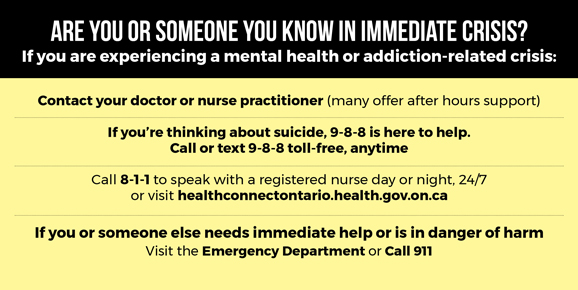WHAT WE OFFER
The Psychosis Assessment & Treatment Clinic (PATC) is a community mental health program within Mental Health Services at Peterborough Regional Health Centre (PRHC), established to provide assessment, treatment and rehabilitation for people with schizophrenia and other psychosis disorders. PATC offers care to patients and their families aged 18 years and over in Peterborough County and the City of Peterborough.
Patients under the age of 18 will be referred to the Lynx, early psychosis intervention program.
SERVICES
PATC provides the following services:
HOW TO REFER TO PATC
Referrals can be made directly by the person needing assistance, community agencies, physicians and family members.
FREQUENTLY-ASKED QUESTIONS
Can ODSP forms be filled out by a Psychiatrist at the Clinic? If so, are there any associated costs/fees?
If a person has been assessed by and is receiving treatment from a Psychiatrist in the Schizophrenia Clinic it is possible to have their Psychiatrist complete the person’s ODSP Forms without charge. However, the person must first meet the criteria to be eligible for ODSP prior to the form being completed.
Can prescriptions be refilled over the phone?
Usually, prescriptions are given to clients at their regular scheduled appointments with their psychiatrist. Prescription refills may be called into a pharmacy by the psychiatrist without requiring an appointment. This is done only on an emergency basis.
If medication is not working effectively, can my dosage be increased or decreased over the phone?
Only a psychiatrist can increase or decrease the dosage of your medication through a phone call. A change to another medication requires an appointment with a Psychiatrist.
What is Schizophrenia?
Schizophrenia is a complex brain disorder thought to result from a biochemical imbalance. The cause of this illness is unknown. However, changes in the regions of the brain that control thinking, feeling, perceiving and behaving indicate that the brain is the biological site of Schizophrenia. Researchers suspect that neurotransmitters (substances through which cells communicate) such as dopamine, serotonin may be involved.
Other areas of the brain affected are the limbic system (part of the brain involved with emotion), and the thalamus (which coordinates outgoing messages in the brain). Several other brain regions may be affected.
Can Schizophrenia be cured?
As with many illnesses, there is currently no cure. However, there is treatment available that can assist a person in effectively managing their illness.
How is Schizophrenia treated?
Schizophrenia is treated with appropriate psychiatric treatment (medications) and psychosocial interventions. To minimize and reduce the impact of the disease, early diagnosis and treatment is extremely important.
What is the prevalence of Schizophrenia?
Approximately 1 in 100 people (1%) of the population are affected by schizophrenia. The risk is higher if a family member (e.g. parent or sibling) develops the illness.
What are some of the symptoms of Schizophrenia?
Symptoms can include; hallucinations, delusions, disorganized speech, disorganized behavior, lack of motivation and more.
RESOURCES



